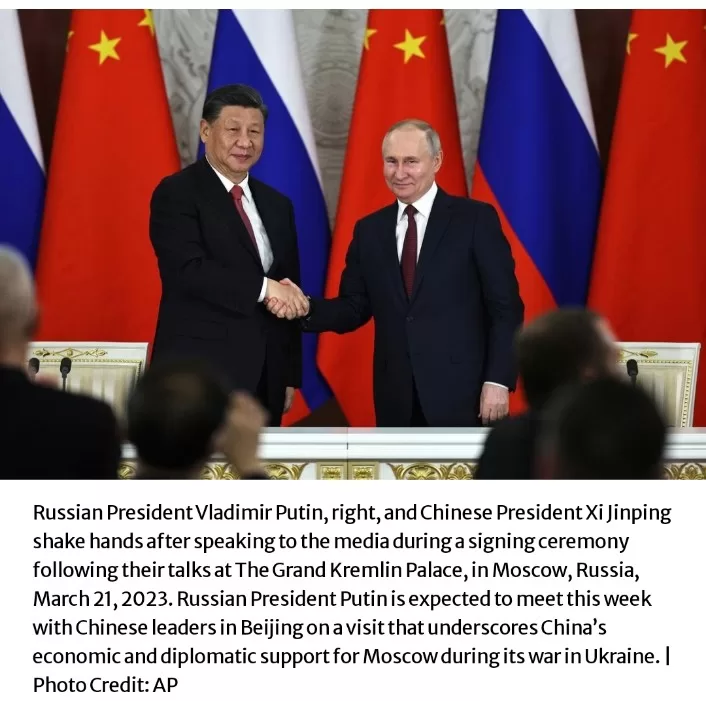Russian President Vladimir Putin is anticipated to convene with Chinese dignitaries in Beijing this week, a visit that accentuates China’s robust economic and diplomatic support for Moscow amid the ongoing conflict in Ukraine.
The two nations have tactically cemented an informal alliance that pits them against the United States and other democratic nations, a partnership that is now further complicated by the ongoing Israel-Hamas conflict. China, on its part, has been endeavoring to strike a balance between its association with Israel and its substantial economic ties with Iran and Syria, both of which enjoy significant backing from Russia.
Mr. Putin’s forthcoming visit serves not only as a display of solidarity but also as an endorsement of Chinese leader Xi Jinping’s ambitious Belt and Road Initiative (BRI), aimed at expanding China’s overseas influence and constructing essential infrastructure across the globe.
This occasion marks the 10th anniversary of Xi’s initial announcement of the BRI, a policy that has seen several countries, including Zambia and Sri Lanka, burdened with substantial debt after inking agreements with Chinese companies for infrastructural development they could not financially sustain.
While Mr. Putin’s visit to China has not been officially confirmed, Chinese officials have hinted at his arrival on the evening of October 16.
In response to questions regarding the visit on October 13, Mr. Putin stated that the discussions in China would revolve around Belt and Road-related projects, with Moscow keen on aligning these endeavors with the efforts of an economic coalition of ex-Soviet Union nations primarily located in Central Asia, all in pursuit of shared development objectives. He also sought to minimize the impact of China’s economic influence in a region historically regarded as Russia’s sphere of influence, where it has worked assiduously to maintain its political and military dominance.
Mr. Putin articulated, “We don’t have any contradictions here; on the contrary, there is a certain synergy.” He underscored the synergy between the two nations and emphasized the growing financial and economic connections between Moscow and Beijing.
“Financial relations and creating further incentives for payments in national currencies are one of the main areas of discussion,” Mr. Putin elucidated. “The volume is growing rapidly, and there are promising prospects in high-tech sectors, particularly in the energy domain.”
Alexander Gabuev, the director of Carnegie Russia Eurasia Center, elucidated the reciprocal benefits of this relationship. He contended that for China, Russia represents a reliable neighbor that provides raw materials at a favorable cost, supports Chinese global initiatives, and offers valuable military technologies that China lacks.
He stated, “For Russia, China is its lifeline, an economic lifeline in its brutal suppression of Ukraine. It’s the major market for Russian commodities, it’s a country that provides its currency and payment system to settle Russia’s trade with the outside world—with China and many other countries. It is also the primary source of sophisticated technological imports, including dual-use goods that contribute to the Russian military complex.”
While a comprehensive military alliance between Moscow and Beijing is unlikely, defense cooperation is expected to strengthen. Gabuev clarified, “I don’t expect that Russia and China will create a military alliance. Both countries are self-sufficient in terms of security and benefit from partnering, but neither really requires a security guarantee from the other. They both advocate strategic autonomy.”
He further elucidated, “There will be no military alliance, but there will be closer military cooperation, increased interoperability, joint efforts to project force together, including in regions like the Arctic, and more collaborative endeavors in missile defense that will complicate U.S. nuclear planning in Asia and Europe.”
The collaboration between China and the former Soviet Union has evolved significantly from their Cold War rivalry. They have since joined forces in economic, military, and diplomatic spheres. A stark illustration of this partnership occurred just weeks before Russia’s full-scale invasion of Ukraine last February when Putin and Xi met in Beijing and inked an agreement emphasizing a “no-limits” relationship. China’s attempts to position itself as a neutral mediator in Russia’s conflict with Ukraine have been met with skepticism by the international community.
Xi reciprocated this engagement by visiting Moscow in March, demonstrating the remarkable frequency of exchanges between the two nations. Their partnership endures, with both countries pursuing their respective global objectives, underpinned by a strategic alignment.




